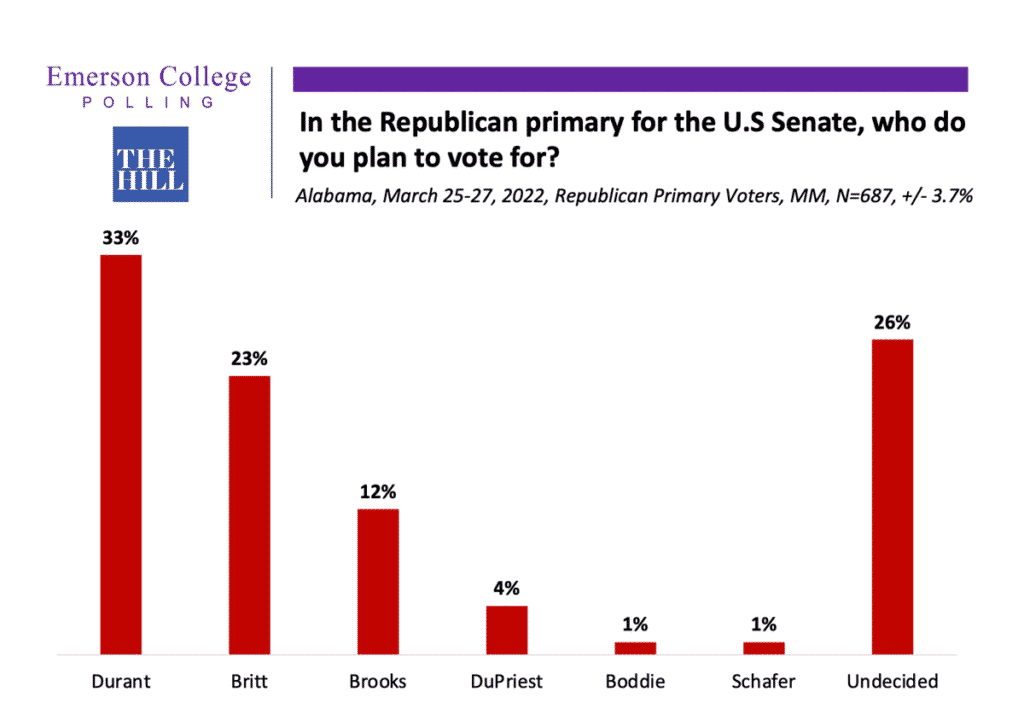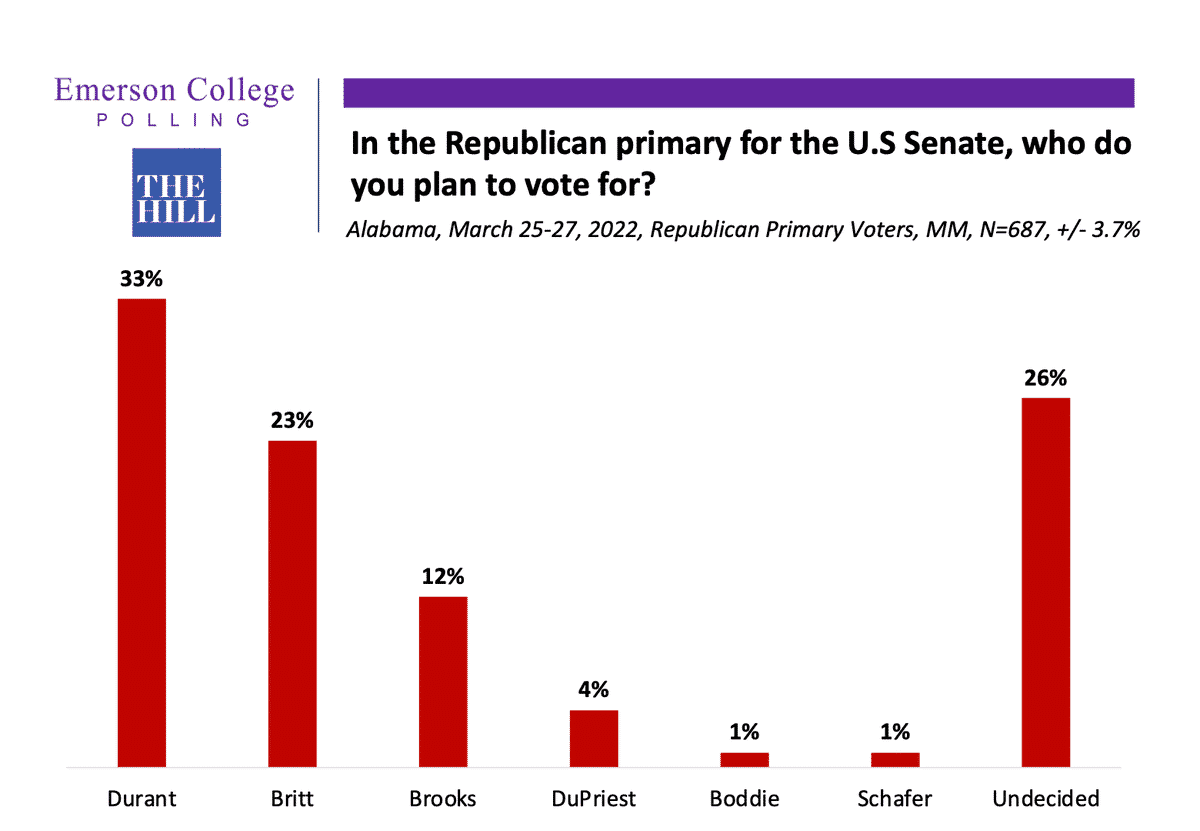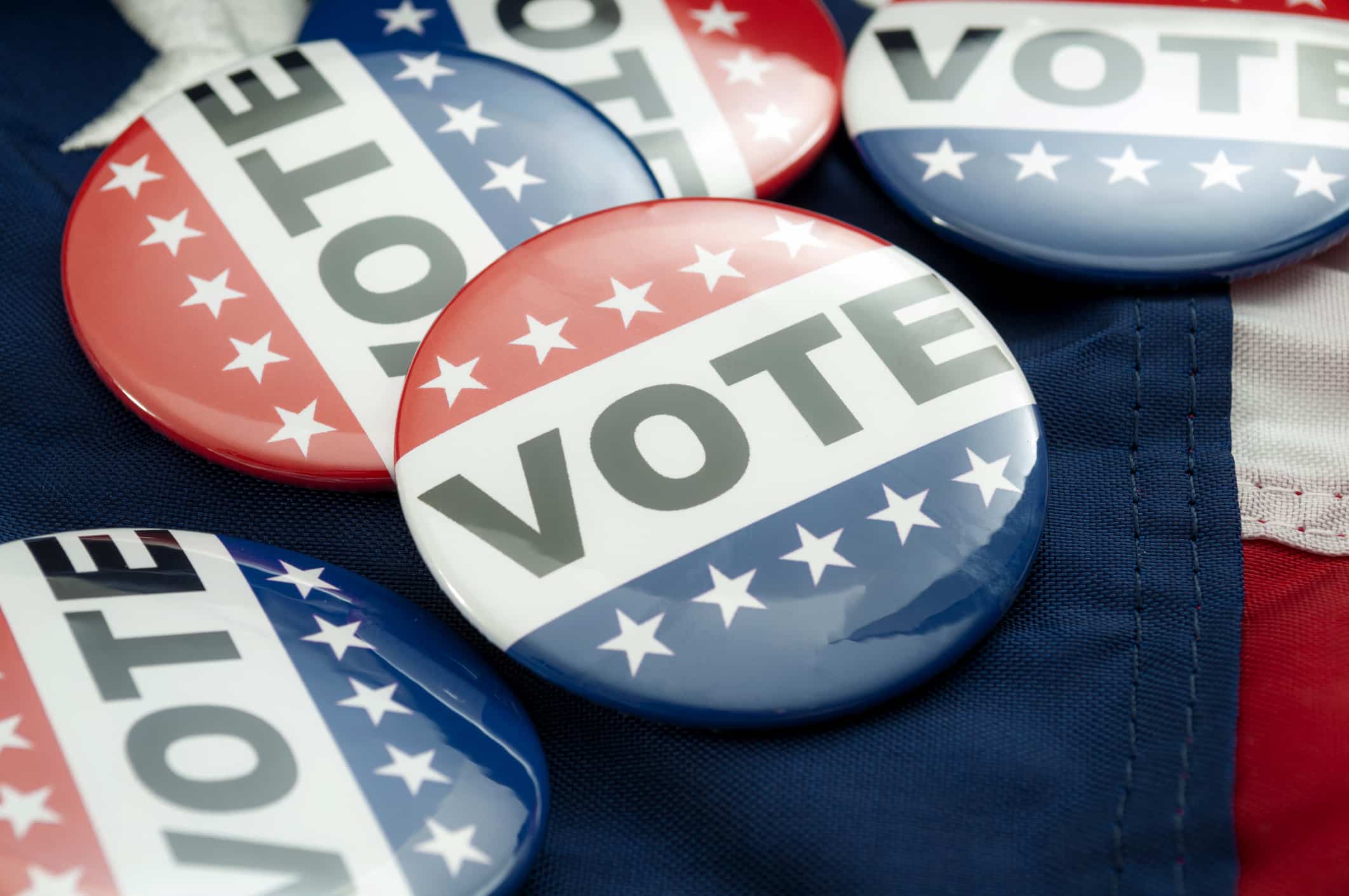In the race to fill the open seat left by retiring Senator Richard Shelby (R), a new Emerson College Polling/The Hill poll finds Mike Durant leading the Republican primary with 33%, followed by Katie Britt with 23%, and Mo Brooks with 12%. No other candidate reaches double digits. Twenty-six percent (26%) are undecided.

In the race to fill the open seat left by retiring Senator Richard Shelby (R), a new Emerson College Polling/The Hill poll finds Mike Durant leading the Republican primary with 33%, followed by Katie Britt with 23%, and Mo Brooks with 12%. No other candidate reaches double digits. Twenty-six percent (26%) are undecided.
Spencer Kimball, Executive Director of Emerson College Polling noted, “while Durant holds a lead over Britt and Brooks in the primary, he is shy of the necessary 50% to avoid a runoff in June.” Kimball added, “the majority (52%) of Republican primary voters say Donald Trump’s endorsement makes them more likely to support a candidate. Senator Shelby’s endorsement holds less weight; 46% say it makes no difference to their vote.”
Kimball continued, “Whether Durant or Britt clinches the nomination might depend on who former President Trump chooses to endorse. Among the 26% of Republican primary voters who are undecided, 60% are more likely to vote for a candidate if Trump endorses them.”
Fifty-two percent (52%) of Alabama primary voters approve of the job Kay Ivey is doing as governor, while 33% disapprove. Ivey holds 48% of support in the Republican gubernatorial primary, followed by Tim James with 11% and Lynda Blanchard with 8%. Twenty-two percent 22% of Republican voters are undecided.
Kimball said, “While Ivy is at 48% in the primary ballot test, she has a 64% approval rating among Republican primary voters, which might allow her to reach 50% to avoid a run-off.”
In the Democratic primary for Senate, a significant majority 67% of voters are undecided. Candidates Will Boyd holds 11% of support while Victor Williams is at 10%. Similarly, for Governor, most Democratic primary-voters are undecided (59%); Yolanda Flowers is the only candidate to clear double digits with 11%.
Alabama primary voters were asked if they prefer to see a United States Senator with “years of political experience,” or a “political outsider.” A majority (55%) of voters said they prefer a political outsider as Senator, whereas 45% prefer someone with years of political experience. Among Democratic primary voters, 69% would like a candidate with experience while among Republican primary voters 68% would like a political outsider.”
Kimball continued, “The data suggests that party affiliation is driving the type of candidate each party would like to see in office; Democrats looking for someone with years of political experience while Republicans are looking for a political outsider”
President Joe Biden has a 34% approval among primary-voters in Alabama, while 59% disapprove of the job he is doing as president. Among Democratic primary voters Biden holds a 78% approval while among Republican primary voters Biden holds an 85% disapproval.
A plurality (47%) of Alabama primary voters do not think marijuana should be legal for recreational purposes in Alabama, while 42% think it should be legal.
When asked if they feel laws covering the sale of firearms should be made more strict, less strict, or kept as they are now, 37% say they should be more strict, 17% less strict, and 39% think they should be kept as they are. Seven percent (7%) are unsure.
A majority (65%) believe that Alabama runs fair elections, while 17% think they do not. Democrats are more likely to vote via mail 24% to 8%. Republicans are more likely to vote on election day 91% to 76%.
Voters were asked if they support or oppose the “Alabama Heartbeat Act,” bill that would prohibit medical providers from performing an abortion once a heartbeat is detected, 75% strongly (55%) or somewhat (20%) support the bill, while 25% somewhat (10%) or strongly (15%) oppose the bill.
Caller ID
The Emerson College/The Hill Alabama poll was conducted March 25-27, 2022. The general election sample consisted of very and somewhat likely voters in Alabama, n=1,047 with a Credibility Interval (CI) similar to a poll’s margin of error (MOE) of +/- 3 percentage points. The Republican primary sample consisted of likely voters, n=687, with a Credibility Interval (CI) similar to a poll’s margin of error (MOE) of +/- 3.7 percentage points. The Democratic primary sample consisted of likely voters, n=359, with a Credibility Interval (CI) similar to a poll’s margin of error (MOE) of +/- 5.1 percentage points. The data sets were weighted by gender, age, education, race, and region based on 2020 turnout modeling. It is important to remember that subsets based on gender, age, party breakdown, ethnicity, and region carry with them higher margins of error, as the sample size is reduced. Data was collected using a cellphone sample of SMS-to-web, an online panel provided by Amazon MTurk, and an Interactive Voice Response (IVR) system of landlines.





